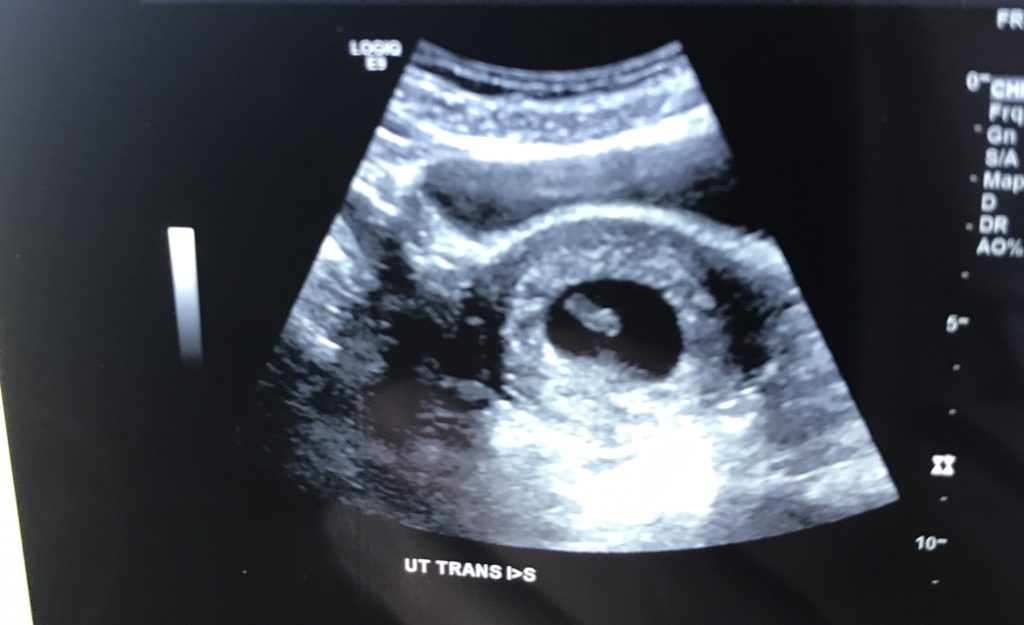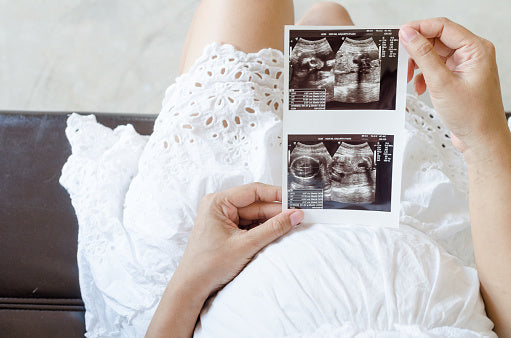

Ultrasound Visits Between 4-13 Weeks Pregnant
The first time you go for a pregnancy ultrasound there are so many emotions running through you. You are nervous and excited all at the same time. You want everything to be perfect with your baby, but being a first-time expecting mom brings up so many questions. There are several things to expect when you have your first ultrasound and knowing what to expect in advance can ease some of your tension. Here are some of the most common questions and answers regarding ultrasounds in the first trimester.

Will I hear my baby’s heartbeat?
If you are going for an ultrasound at six weeks pregnant, there is a chance that you will hear the baby’s heartbeat. At six weeks, the heart has started to form, and the first little flutters of a heartbeat can be seen and heard by your doctor or ultrasound technician. Sometimes, however, it is hard to find at this week of pregnancy. Try not to panic, this is common. You may be asked to come back in a week or two for a repeat ultrasound.
In addition to a heartbeat, the technician is looking for several important things regarding the health of the baby and the viability of the pregnancy.
The sonographer will look for a double decidual reaction sign, which is essential like a thickened endometrium wall that surrounds the gestational sac. This is a positive sign that pregnancy has occurred.
He or she will also be looking to see where the pregnancy is occurring. Ideally it will be in your uterus, however ectopic pregnancies do occur. This means that the embryo has implanted in the fallopian tubes or somewhere else outside of the uterus. This is a dangerous situation for the expecting mother, as the fallopian tubes, cervix, and other non-uterine areas are not designed, or meant, to sustain a full-length pregnancy. If you have an ectopic implantation, the pregnancy will need to be terminated to avoid tubal rupture or life-threatening injury to the mother.

When you schedule your first ultrasound, they will ask that you to arrive with a full bladder. This is perfectly common, albeit uncomfortable. Because your baby is only the size of a sweet pea, the technician needs to get the bladder out of her field of vision in order to have a clear view of your uterus. The best way to accomplish this is by having a full bladder.
When your bladder is full, it lifts off the uterus and the technician may see it more clearly. If you are receiving an external, abdominal ultrasound scan, the technician will quickly put ultrasound gel on your stomach and rub the handheld transmitter over your stomach. When she has a clear picture of the baby’s location, she will tell you can you go and empty your bladder before the rest of the exam takes place.
It is more common that the first ultrasound is done trans-vaginally at this early stage of pregnancy. The technician will insert a vaginal wand transmitter inside your vagina, and then she will maneuver it from there to take measurements and other important data. A transvaginal ultrasound is done to get the best look at the baby. This part of the test does not hurt. It may feel a little strange and uncomfortable, but you shouldn’t feel pain. If anything hurts or doesn’t feel alright, express this to the technician. She may be trying to get the different view and it’s putting pressure on your ovaries or other areas.

Unless you are receiving an emergent scan done at the hospital, you will most likely receive an image of your baby at this first ultrasound. Ask your technician before she is done scanning you to make sure they will print it out for you. Ultrasound scans are cherished memories that will last a lifetime, and you may use your scans for keepsakes, digital pregnancy announcements, and to place in your baby book!
Yes! The technician will give you an estimated due date based on the first day of your last menstrual cycle and the size of the embryo. If you aren’t sure when your last period occurred, the due date will not be exact, but a good estimate. If you forget to ask, the gestational age will most likely be noted on the scan. If you need to calculate your due date, you can use our Due Date calculator to give you a good idea.
Will my doctor order additional tests?
- Rh factor
- Anemia
- Rubella (a titer test for immunity)
- Hepatitis B
- HIV
- Syphilis and other STDs
- Tay-Sachs
- Cystic Fibrosis
- Sickle Cell Anemia
- Toxoplasmosis
- Varicella (a titer test for immunity)
- hCG and/or Progesterone
- Glucose
- Urine Protein
- Kidney Function
In conclusion
Being pregnant, whether it’s your first child or fourth, can be extremely exciting, as well as scary. You are more cautious about diet, exercise, and overexertion. While there are factors that can put you and your baby at risk, most people have successful pregnancy’s with healthy children. Doctors do screen and conduct tests to rule out significant issues with your baby, and ultrasounds are one of the first items on the checklist. Try to remember to enjoy being pregnant and don’t get caught up in the statistics of it all. Also, be sure to frame those first baby pictures!
